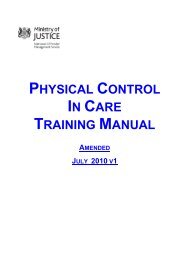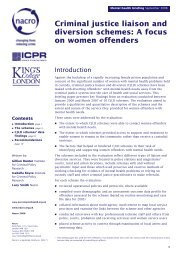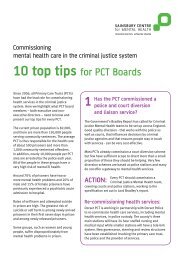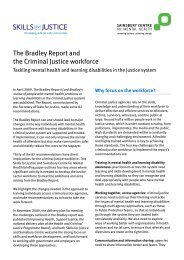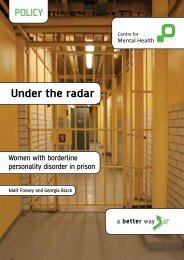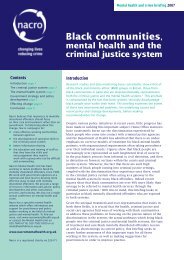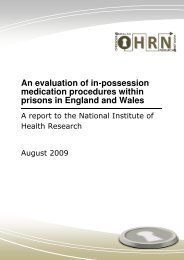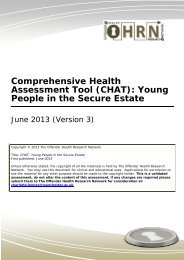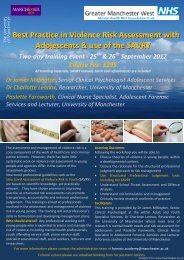Engendering Justice - from Policy to Practice - The Fawcett Society
Engendering Justice - from Policy to Practice - The Fawcett Society
Engendering Justice - from Policy to Practice - The Fawcett Society
- No tags were found...
You also want an ePaper? Increase the reach of your titles
YUMPU automatically turns print PDFs into web optimized ePapers that Google loves.
not be means tested.• First night in cus<strong>to</strong>dy initiatives such as that run by thePrison Advice and Care Trust should be introducedacross the female prison estate.• Regular children and family visits should be allowed andthe cost of phone calls <strong>from</strong> prison should be reducedin line with standard call costs.• Improvements should be made <strong>to</strong> visiting halls <strong>to</strong> createa more welcoming environment for children and thebooking system should be improved <strong>to</strong> allow visits <strong>to</strong>be booked online or for the next visit <strong>to</strong> be bookedduring each visit.• Support should be provided <strong>to</strong> female offenders <strong>to</strong>assist them <strong>to</strong> engage in care proceedings.• Pre-natal and post-natal care for pregnant womenincluding ongoing support <strong>to</strong> breastfeed whereappropriate, should be available in all women’s prisons.• Prison staff assigned <strong>to</strong> women who are giving birthshould be made clearly aware of privacy requirementsas well as what food and clothing arrangements areallowed for mother and baby and should ensureprovision is made for this.• Childcare, parent training and counselling and <strong>to</strong>ysand learning materials should be made available in allMother and Baby Units.• A staff camera should be kept in each MBU <strong>to</strong>allow mothers <strong>to</strong> take pho<strong>to</strong>s of their babies undersupervision. Women should be provided with copies ofthese pho<strong>to</strong>s during their time in prison and a disk ofthese pho<strong>to</strong>s upon release.• Evidence-based intensive programmes should bedesigned specifically for offenders serving sentencesof less than twelve months by the Department forInnovation, Universities and Skills, the Learning andSkills Council and NOMS in partnership.• A core curriculum of courses should be deliveredthroughout the prison estate and providers should berequired <strong>to</strong> transfer information about an offender’slearning progress when transfer occurs or upon releasein<strong>to</strong> the community.• Female offenders serving life sentences should haveaccess <strong>to</strong> a range of accredited programmes whichreflect the different learning styles of women and theseshould be accorded the same status as traditional maleaccredited programmes.• Research should be conducted in<strong>to</strong> the distinctneeds of ethnic minority women and their patterns ofoffending.• <strong>The</strong> use of interpreters and the employment of staffwho speak the languages of ethnic minority womenshould be implemented throughout the female prisonestate. Staff should also be trained in some basicwords <strong>from</strong> the most common languages.• An urgent review is needed of the complex issuessurrounding foreign national female offenders and anexamination of alternative options <strong>to</strong> lengthy sentences.• <strong>The</strong> monthly free call allowance of 5 minutes for foreignnational prisoners should be increased <strong>to</strong> 20 minutes amonth.• If prison staff become aware, or have a suspicion, thata woman has been a victim of trafficking, she shouldbe referred immediately <strong>to</strong> support services such as thePoppy Project.• In cases where an appeal against a cus<strong>to</strong>dial sentenceon the grounds that an individual has been traffickedis underway, and the individual’s sentence expires,the woman should not be au<strong>to</strong>matically be sent <strong>to</strong> adetention centre but should be released in<strong>to</strong> the care ofan appropriate support service, pending the outcomeof the appeal.• Staff who work in women’s prisons and probationservices should be trained <strong>to</strong> address the needs offemale victims of violence, including screening, riskassessment, safety planning and referral <strong>to</strong> specialistservices.• <strong>The</strong> probation and prison service should take a leadrole in coordinating the contributions of specialist andvoluntary sec<strong>to</strong>r agencies in order <strong>to</strong> help women dealwith past violence and abuse within the prison systemand funding should be allocated <strong>to</strong> these programmes.Resettlement:• Women who have children in care as a result of theirprison sentence should be made a priority on thehousing waiting list and should also be eligible <strong>to</strong> applyfor housing with an appropriate number of bedroomsupon social services confirming the number of children.• Well in advance of release, women should be assistedby prison staff, or voluntary sec<strong>to</strong>r agencies shouldbe funded <strong>to</strong> assist these women, <strong>to</strong> complete therequired application for benefits.• Women should be provided with sufficient quantitiesof any prescription medication <strong>to</strong> allow time <strong>to</strong> registerwith a G.P.Page 103



